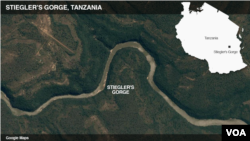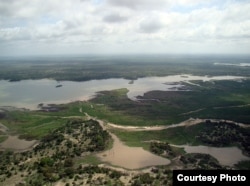The United Nations has called it one of Africa's biggest remaining wilderness areas. Now a dispute over a planned hydropower dam in Tanzania's Selous wildlife reserve pits the country's president against conservationists who say the project could cause irreparable damage to the UNESCO World Heritage site.
On Tuesday, a few days after President John Magufuli said the Stiegler's Gorge dam will be built "come rain, come sun," the WWF conservation group said in a report that the project threatens an important wetland as well as the livelihoods of more than 200,000 people in impoverished areas, reliant on fishing, that would be downstream.
The Selous, which covers nearly 50,000 square kilometers (19,300 square miles), has been under pressure from poachers who have decimated its elephant population to supply the illegal ivory market. Mining concessions and other industrial projects are also a concern as the East African nation's campaign to boost its economy conflicts with international efforts to preserve habitats and their wildlife.
Speaking Saturday in Dar es Salaam, Magufuli said the dam and resulting reservoir will cover only about 3 percent of the Selous.
"We are not going to listen to people who speak about impacts on environment without facts on the ground," Magufuli said, according to Tanzania's Daily News newspaper.
However, conservationists say the project could have a negative impact on a much bigger area, for example by cutting off wildlife migration routes. The WWF has asked for an environmental assessment in line with Tanzanian law and wants the government to consider alternative ideas for generating power.
Tourism Minister Jumanne Maghembe told The Associated Press that Tanzania is a developing country and needs to use its natural resources to transform its economy.
He also said the government had long set aside 38 percent of the country's land for wildlife conservation. "It's too huge area, we need the project for our development," he said.
The plan at Stiegler's Gorge has been discussed for decades. Once completed, the project would increase Tanzania's power generation from 1,450 megawatts to at least 4,000 megawatts, according to the Daily News.






